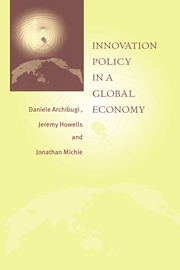Book contents
1 - Innovation systems and policy in a global economy
Published online by Cambridge University Press: 05 November 2009
Summary
New technologies are a fundamental part of modern economic life. Economists and engineers, no less than politicians and public opinion, are devoting increasing attention to understanding why, how and where technological innovations are generated. This book is devoted to discussing two separate, but closely connected bodies of literature on the sources and nature of new technologies. The first set is focused on the similarities and differences in the organisation of innovative activities at the national level, whilst the second group is centred on the role of globalisation in shaping technological change.
The first body of literature stresses that a proper understanding of technological developments, and their dissemination throughout the economy and society, requires us to also understand the social fabric that shapes these developments. Over the last decade, the notion of systems of innovation, either local, regional, sectoral or national, has been widely used to map and explain the interactions between agents that generate and use technology.
The second body of literature has studied how innovation interacts with economic and social globalisation. The debate on globalisation has flourished over the last decade and a large number of themes connected to it have been investigated. Trade, production, finance, culture, media and many other fields have been scrutinised from the viewpoint of globalisation. The issue of technological change has been at the core of these debates on globalisation, and rightly so. On the one hand, technology is a vehicle for the diffusion of information and knowledge across borders; on the other hand, technological developments have themselves been stimulated by the globalisation of markets.
- Type
- Chapter
- Information
- Innovation Policy in a Global Economy , pp. 1 - 16Publisher: Cambridge University PressPrint publication year: 1999
- 18
- Cited by



